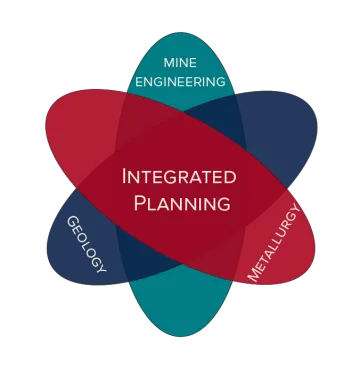Finding, developing, and extracting mineral resources goes smoothest when everyone on the team works together, communicates effectively, and understands the whole value chain – not just one piece of it. But all too often, mining engineers, geologists, and metallurgists work in separate siloes. Breaking down these siloes takes either decades of experience or specialized, interdisciplinary, industry-focused training not offered at conventional university programs.

Recognizing this critical gap in education, the Lowell Institute for Mineral Resources collaborated with Newmont Mining and Freeport-McMoRan Inc. to develop a series of 3 short courses designed to break down barriers to communication and improve collaboration among geologists, mining engineers, and metallurgists in the mining industry. Each course introduces the fundamentals and role of one profession to the other two from the perspective of top geologists, engineers, and metallurgists in the mining industry.
Geological Inputs to Integrated Planning
Geological Inputs to Integrated Planning is designed for junior- to mid-level geologists, metallurgists, and other mineral resource industry professionals. Topics include ore deposits geology, geology and geotechnics, geometallurgy and process mineralogy, resource block modeling, and how to communicate effectively with geoscientists.
The Geological Inputs to Integrated Planning course allows you to continue developing your professional skills. Starting in Fall 2025, we will offer this course fully online so that you can learn at a distance, at your own pace, and focus on what is most important to you. This course is self-guided and pre-recorded; however, we will offer live sessions for QA and discussions.
- The role of geology and geologists in exploration, mine operations, and business planning
- Mineralogical inputs to processing and extraction plans
- Geological controls on geotechnical factors
- Collection, interpretation, and analysis of geological data
- Geological and block modeling and interface with mine planning
Developed in collaboration with Newmont Mining.
The online tuition is currently $400.
The course is free for full-time U of A students (Course No. GEOS 504D).
Mine Engineering Inputs to Integrated Planning
Mine Engineering Inputs to Integrated Planning is designed for junior- to mid-level geologists, metallurgists, and other mineral resource industry professionals. Topics include mine design, excavation design and management, long-range and short-range planning, resource and reserve reporting, project valuation, and how to communicate effectively with mining engineering professionals.
The Mine Engineering Inputs to Integrated Planning course allows you to continue developing your professional skills. Starting in Spring 2026, we will offer this course fully online so that you can learn at a distance, at your own pace, and focus on what is most important to you. This course is self-guided and pre-recorded; however, we will offer live sessions for QA and discussions.
- The role of mining engineering and engineers in project valuation, development, and operation.
- Economic, geomechanical, geological, metallurgical, and infrastructure factors in project design and operation.
- Parameter selection and pit and phase design.
- Production scheduling, long-, medium-, and short-range planning, and reconciliation
- Resource estimation and reporting.
Developed in collaboration with Freeport-McMoRan Inc.
The online tuition is currently $400.
The course is free for Full-time U of A students (course Nr. GEOS 504E)
Metallurgical Inputs to Integrated Planning
Metallurgical Inputs to Integrated Planning is designed for junior- to mid-level geologists, metallurgists, and other mineral resource industry professionals. Topics include comminution, separation, pyrometallurgical processing, leaching, solvent extraction, and electrowinning, and how to communicate effectively with metallurgists.
The Metallurgical Inputs to Integrated Planning course allows you to continue developing your professional skills. Starting in Fall 2026, we will offer this course fully online so that you can learn at a distance, at your own pace, and focus on what is most important to you. This course is self-guided and pre-recorded; however, we will offer live sessions for QA and discussions.
- The role of metallurgy and metallurgists in mine design, operations, and planning;
- Mineralogical, economic, and chemical factors in recovery;
- Parameters in processing and extraction system design, operation, and planning;
- Methods of predicting, testing, and monitoring performance.
Online tuiton is $400.
The course is free for current full-time students at the University of Arizona (GEOS 504F).
